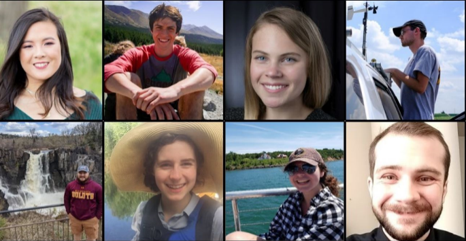Winter 2021 eNewsletter
2021 Great Lakes Summer Fellows Video Series
 In partnership with NOAA’s Great Lakes Environmental Research Laboratory (GLERL), CIGLR hosts a cohort of students each summer to participate in the Great Lakes Summer Fellows Program. This video series highlights CIGLR’s 2021 fellows, their research, and the virtual fellowship program that included career training opportunities to equip students with the knowledge and skills to be the next generation of Great Lakes scientists. Interested in the 2022 Great Lakes Summer Fellow Program? Click here to learn more and apply.
In partnership with NOAA’s Great Lakes Environmental Research Laboratory (GLERL), CIGLR hosts a cohort of students each summer to participate in the Great Lakes Summer Fellows Program. This video series highlights CIGLR’s 2021 fellows, their research, and the virtual fellowship program that included career training opportunities to equip students with the knowledge and skills to be the next generation of Great Lakes scientists. Interested in the 2022 Great Lakes Summer Fellow Program? Click here to learn more and apply.
Courtney Cameron was mentored by Drs. Rochelle Sturtevant (Michigan Sea Grant), Ashley Elgin (NOAA GLERL), Lindsay Chadderton (Nature Conservancy), and Alisha Davidson (independent consultant) to expand the Great Lakes Aquatic Nonindigenous Species Information System (GLANSIS). She says, “This fellowship helped me understand how science can be used to inform important management decisions regarding the health of natural ecosystems.”
Sean Daly was mentored by Dr. Philip Chu (NOAA GLERL) to develop an integrated data visualization and user interface for digital charting tables onboard Great Lakes cruise vessels. He says, “I now have the skills to critique and improve existing data visualizations and I look forward to applying these skills in my future research.”
Julie Dellick was mentored by Lacey Mason (NOAA GLERL) and Drs. Hank Vanderploeg (NOAA GLERL), Ed Rutherford (NOAA GLERL), Doran Mason (NOAA GLERL), and Craig Stow (NOAA GLERL) to study the role of increased water clarity on fine-scale vertical distribution and density of macrozooplankton and fish larvae in Lakes Michigan and Huron. She says, “Having the opportunity to interact and engage with this group of scientists has allowed me to find new and innovative ways to approach my own research.”
Collin DeYoung was mentored by Drs. Brent Lofgren (NOAA GLERL) and Jia Wang (NOAA GLERL) to analyze upper-level atmospheric circulation patterns associated with Great Lakes ice cover. He says, “Working with the team at CIGLR and NOAA was my favorite part of this fellowship. The scientists who work there are always enthusiastic to share the work that they have done and all of their diverse career experiences.”
Jacob Fredrickson was mentored by Dr. Mike Fraker (CIGLR), Russ Miller (CIGLR), and Lauren Marshall (NOAA Affiliate) to analyze fine-scale analysis of Lake Michigan glider data. He says, “I loved working with and learning about the glider and the data it collects. Gliders are an extremely helpful tool for both oceanographic and limnological applications.”
Isabelle Horvath was mentored by Drs. Casey Godwin (CIGLR), Timothy Maguire (CIGLR), Craig Stow (NOAA GLERL), and Sally Patrella (Friends of the Rouge) to expand and contribute to Detroit citizen science and water quality modeling. She says, “My favorite part of this fellowship was working with citizen science data. I experienced firsthand the wealth of knowledge and passion that communities hold for their environment.”
Tyler Summers was mentored by Dr. Jia Wang (NOAA GLERL) to investigate connection patterns between Great Lakes and Arctic ice cover in response to teleconnection forcing. He says, “My favorite part of the fellowship as interacting with so many scientists and professionals from diverse backgrounds, fields and specialties.”
